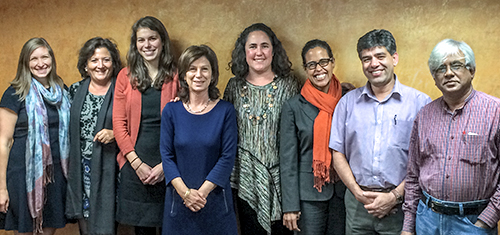ANSIRH’s Global Turnaway Studies were inspired by the success of the U.S. Turnaway Study, a five-year prospective longitudinal study of the impact of receiving versus being denied an abortion on women’s physical and mental health and socioeconomic well-being in the U.S.
For a summary of recommendations based on the results of the Global Turnaway Study, download "Improving abortion service delivery and quality of care: Recommendations based on experiences of women turned away from abortion care."
View the Global Turnaway Study video In Their Own Words: Experiences of Women Denied Abortions, featuring women speaking about their experiences after being denied abortions across the world. The video is also available with French or Spanish subtitles.
Denial of Abortion in Legal Settings
In most countries, women do not have access to safe abortion care: abortion is legal in only 28 percent of all countries in the world and only 15 percent of countries in the developing world. (1) Many women who live in countries where abortion is legally available are unable to access a safe procedure, for myriad reasons, including a lack of knowledge about the legal status of abortion, lack of money to pay for the procedure, social stigma against abortion or, commonly, because they present for care too far along in pregnancy. Unsafe abortion is the second leading cause of maternal mortality worldwide and most unsafe abortions occur in developing countries. (2) Learning about women’s experiences, such as the barriers to accessing legal abortion care and whether they turn to unsafe abortion, would improve our understanding of the effect of restrictive abortion laws on women’s health in diverse legal, cultural and socioeconomic settings.

From left to right: C. Gerdts, S. Hajri, S. Raifman, J. Harries, D. Foster, T. DePiñeres, M. Puri, and A. Hossain at the FIGO World Congress 2015 in Vancouver Canada.
We have partnered with researchers in Bangladesh, Colombia, Nepal, South Africa, and Tunisia—all countries where abortion is legally available—to measure the incidence and reasons for denial of abortion. Our early work showed that many women (2% to 45%) are denied legal abortion care in these countries (Gerdts et al., 2014). We then conducted interviews with women to investigate their experiences with denial and their decision-making following denial of care. Whether women pursue referrals and receive legal abortions elsewhere, whether they seek illegal abortions, or whether they continue the pregnancy is largely unknown. Our preliminary results have important implications for improving quality of service of abortion care, reducing denials of abortion care and improving referrals after abortion denial. We will be disseminating these findings through collaboration with in-country policymakers, providers and advocates, as well as international service provision and training organizations. Ultimately, the long term goal of the project is to launch a multi-country study to compare the consequences of legal abortion, illegal abortion, and carrying an unwanted pregnancy to term in a variety of settings.
Caitlin Gerdts, PhD, Senior Associate at Ibis Reproductive Health, serves as an advisor on the Global Turnaway Studies.
Global Turnaway Study international collaborators and publications
Nepal:
Dr. Mahesh Puri at the Center for Research on Environment Health & Population Activities (CREHPA)
- Publication: ‘I need to terminate this pregnancy even if it will take my life’: a qualitative study of the effect of being denied legal abortion on women’s lives in Nepal
- Publication: Providers’ perspectives on denial of abortion care in Nepal: a cross sectional study
- Research brief from this study: Effects of being denied legal abortion in Nepal
Bangladesh:
Dr. Altaf Hossain at the Bangladesh Association for Prevention of Septic Abortion (BAPSA)
- Publication: ‘How shall we survive’: A qualitative study of women’s experiences following the denial of menstrual regulation (MR) services in Bangladesh
- Research brief from this study: Effects of being denied safe MR in Bangladesh
South Africa:
Dr. Jane Harries at the Women’s Health Research Unit, School of Public Health and Family Medicine, University of Cape Town
- Publication: An exploratory study of what happens to women who are denied abortions in Cape Town, South Africa
- Research brief from this study: Denial of legal abortion in South Africa
Tunisia:
Dr. Selma Hajri at the Groupe Tawhida BenCheikh
- Publication: ‘This is real misery’: Experiences of Women Denied Legal Abortion in Tunisia
- Research brief from this study: La Recherche en Santé Reproductive: le briefing
Colombia:
Dr. Teresa DePiñeres at the Fundación Oriéntame
- Publication: 'I felt the world crash down on me': Experiences of women denied legal abortion in Colombia.
- World Health Organization (WHO). Unsafe Abortion: Global and Regional Estimates of the Incidence of Unsafe Abortion and Associated Mortality in 2008, sixth ed. Geneva: WHO, 2011.
- Sedgh G et al. Induced abortion: incidence and trends worldwide from 1995 to 2008. Lancet 2012; 379: 625–632.

